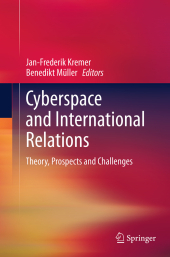 Neuerscheinungen 2016Stand: 2020-02-01 |
Schnellsuche
ISBN/Stichwort/Autor
|
Herderstraße 10
10625 Berlin
Tel.: 030 315 714 16
Fax 030 315 714 14
info@buchspektrum.de |

Jan-Frederik Kremer, Benedikt Müller
(Beteiligte)
Cyberspace and International Relations
Theory, Prospects and Challenges
Herausgegeben von Kremer, Jan-Frederik; Müller, Benedikt
Softcover reprint of the original 1st ed. 2014. 2016. xxiv, 284 S. 2 SW-Abb., 10 Tabellen. 235 mm
Verlag/Jahr: SPRINGER, BERLIN; SPRINGER BERLIN HEIDELBERG 2016
ISBN: 3-662-51174-6 (3662511746)
Neue ISBN: 978-3-662-51174-9 (9783662511749)
Preis und Lieferzeit: Bitte klicken
This book presents new theoretical approaches on international relations and cyber security. It focuses on specific empirical fields of activity and addresses emerging challenges and prospects for international politics and relations.
Cyberspace is everywhere in today´s world and has significant implications not only for global economic activity, but also for international politics and transnational social relations. This compilation addresses for the first time the "cyberization" of international relations - the growing dependence of actors in IR on the infrastructure and instruments of the internet, and the penetration of cyberspace into all fields of their activities. The volume approaches this topical issue in a comprehensive and interdisciplinary fashion, bringing together scholars from disciplines such as IR, security studies, ICT studies and philosophy as well as experts from everyday cyber-practice.
In the first part, concepts and theories are presented to shed light on the relationship between cyberspace and international relations, discussing implications for the discipline and presenting fresh and innovative theoretical approaches.
Contributions in the second part focus on specific empirical fields of activity (security, economy, diplomacy, cultural activity, transnational communication, critical infrastructure, cyber espionage, social media, and more) and address emerging challenges and prospects for international politics and relations.
Foreword.- Introduction.- Part I: The Cyberspace and IR - Theory.-Power Technology and Powerful Technologies - Global Governmentality and Security in the Cyberspace.- Cyber War and Strategic Thought - Do the Classic Theorists Still Matter? - SAM - A Framework to Understanding Emerging Challenges to States in an Interconnected World.- In Search of Cyber Stability - International Relations, Mutually Assured Destruction and the Age of Cyber Warfare.- Offense-Defense Balance in Cyber Warfare.- The Utility of Timeless Thoughts - Hannah Arendt´s Conceptions of Power and Violence in the Age of Cyberization.- Part II: The Cyberspace and IR - Prospects and Challenges.- Clarifying the International Debate on Stuxnet - Arguments for Stuxnet as an Act of War.- A New Way of Conducting War - Cyberwar, Is That Real? - Peacekeeping 4.0 - Harnessing Potential of Big Data, Social Media, and Cyber Technologies.- US Leadership in Cyberspace - Transnational Cyber Security and Global Governance.- Hierarchies in Networks - Emerging Hybrids of Networks and Hierarchies for Producing Internet Security.- How the 2010 Attack on Google Changed the US Government´s Threat Perception of Economic Cyber Espionage.- Cooperative International Approaches to Network Security - Understanding and Assessing OECD and ITU Efforts to Promote Shared Cybersecurity.- Phreak the Speak - The Flawed Communications within Cyber Intelligentsia.- Reflections on Virtual to Real - Modern Technique, International Security Studies and Cyber Security Environment.- Index.


